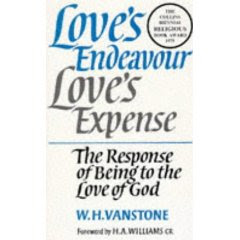

In 1977 I paid £2.95 for my copy of Love's Endeavour, Love's Expense. Ever since, I've lived more deeply, theologised more humbly, loved God more intelligently, preached more creatively, cared more compassionately, prayed more fervently, hoped more persistently, felt more passionately, wept more willingly, laughed more lightheartedly, taken friendship more seriously..at least if I have, it's because of the basic insight that illumines this book.
Canon W H Vanstone is one of that long tradition of Anglican theologians who don't teach practical theology, they instinctively think and live it. For Vanstone all theology must ultimately be pastoral. He never went into academia; resisted any promotion that removed him from his vocation as parish priest in a housing estate in the north of England. He only wrote three books, and this was the first.
The book is about the love of God - risk-filled and vulnerable, precarious and self-emtpying, patiently redemptive but with no guaranteed outcome. Love is essentially the outgoing of generous self-gift. God who is love is "the God Who will not abandon and to Whom nothing save himself is expendable". (65)"If the creation is the work of love, its "security" lies not in its conformity to some predetermined plan but in the unsparing love which will not abandon a single fragment of it, and man's (sic) assurance must be the assurance not that all that happends is determined by God's plan but that all that happens is encomapssed by his love." (66)
The number of analogies from human experience used by Vanstone is a clue to the pastoral nature of his theologising. From half a dozen pastorally borrowed parables here's one to ponder on the way to Easter:
[The love of God] is the love which overflows from fullness. Its analogue is the love of a family who, united in mutual love, take an orphan into the home. They do so not out of need but out of the sheer spontaneity of their own triumphant love. Nevertheless, in the weeks that follow, the family, once complete in itself, comes to need the new-comer. Without him the circle is now incomplete; his absence now causes anxiety; his waywardness brings concern; his goodn4ess and happiness are necessary to those who have come to love him; upon his response depends the triumph or the tragedy of the family's love. in spontaneous love, the family has surrendered its own fulfilment and placed it, precariously, in the orphan's hands. Love has surrendered its triumphant self-sufficiency and created its own need. This is the supreme illustration of love's self-giving or self-emptying - that it should surrender its fullness and create in itself the emptiness of need. Of such a nature is the kenosis of God - the self-emptying of Him Who is already in every way fulfilled." (69)
